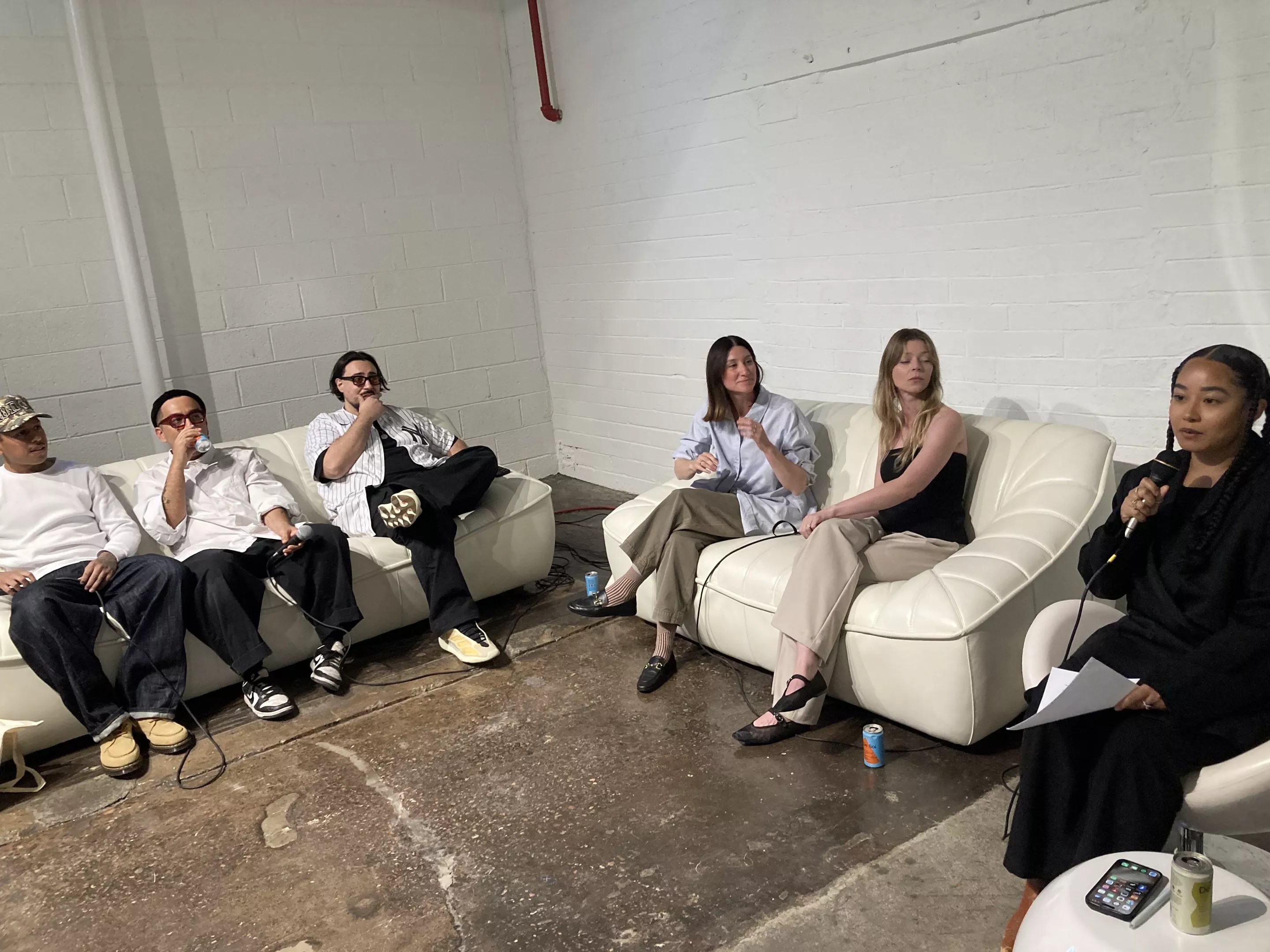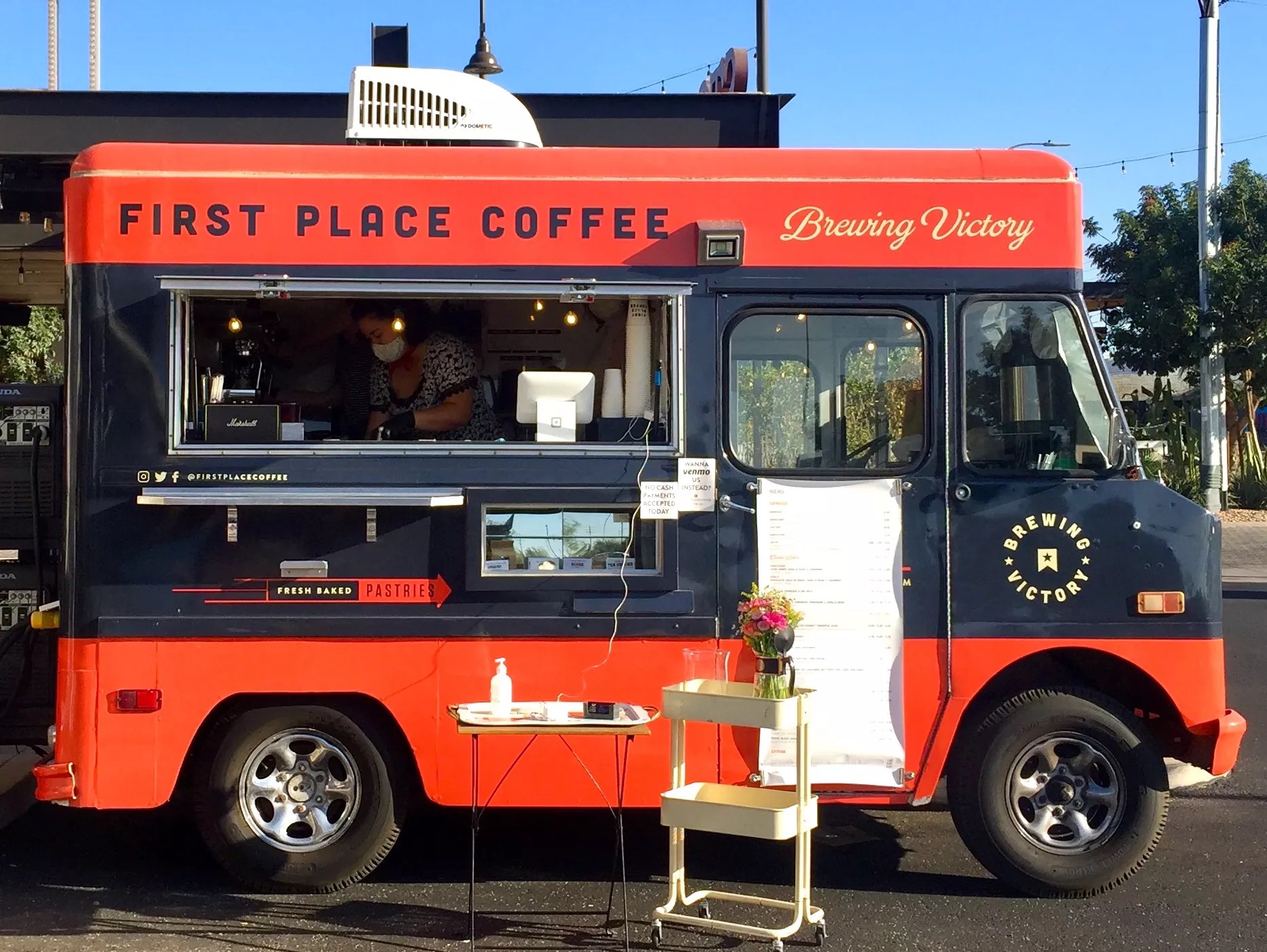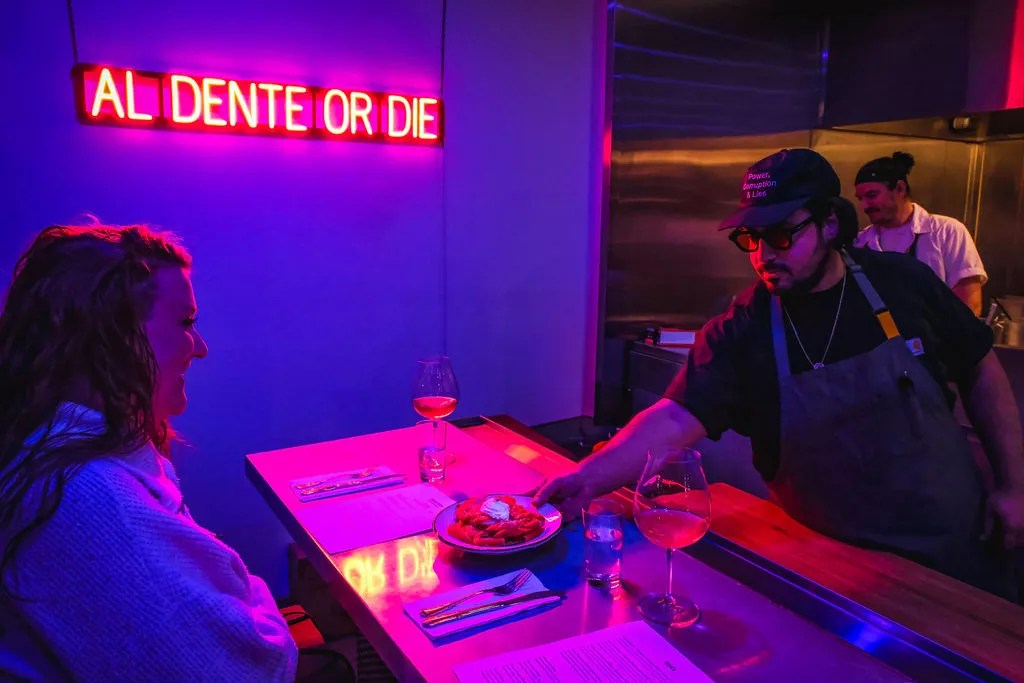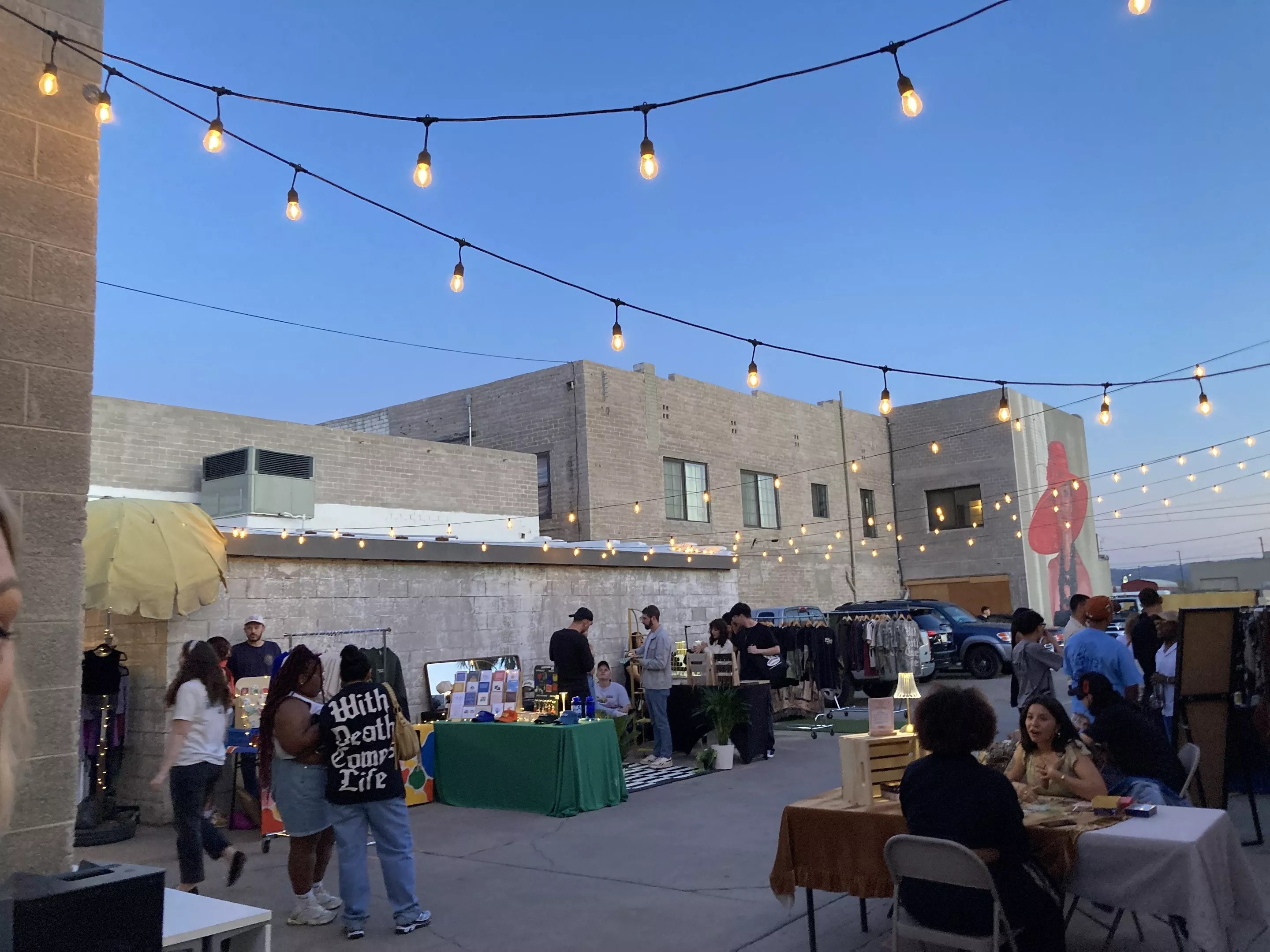
Zach Oden

Audio By Carbonatix
At a recent panel on entrepreneurship, one of the Valley’s most outspoken chefs, Racan Alhoch, jokingly described his brand as “a meme page that makes sauce.”
Alhoch owns Saint Pasta and was among several panelists who shared candid insights into business ownership in the Valley. He recounted his concept’s early days as a successful food truck, its sudden closure and the crucial lessons he learned in securing his first brick-and-mortar location downtown.
“I am being honest with you, but also, I am traumatized, so…” Alhoch wisecracked, setting the warts-and-all tone for the wide-ranging conversation. The event, titled Community Rooted, took place at the Desierto Market at Studio Wilson on March 22.
The panel came about as a collaboration between Evolu Events founder Nisa Lucas and Desierto Market curator Evelin Santillan. It allowed prominent food and beverage pros such as Alhoch and Devon McConville of First Place Coffee, along with photographer Orlando Pelagio, barber Jessie Ponce of The Greater Good, and Mount Sunny acupuncturist Shelby Ramirez, to inspire, celebrate and sometimes commiserate over the trials and tribulations of being an entrepreneur in Phoenix.
Will you step up to support New Times this year?
We’re aiming to raise $30,000 by December 31, so we can continue covering what matters most to you. If New Times matters to you, please take action and contribute today, so when news happens, our reporters can be there.

Devon McConville’s small business hits the streets in Phoenix.
Allison Young
Devon McConville’s First Place Coffee is a mobile coffee truck that sets up at various locations around central Phoenix. She recently announced plans to open a new brick-and-mortar coffee shop called Matilda’s. At the panel, the business owner noted that Phoenix should stop incessantly comparing itself to other cities. Citing her New York roots, she explained that Phoenix’s food scene has a different energy than other prominent food destinations, and that could work in our favor.
“We’re not LA, and we’re not New York. We, as Phoenicians, don’t need to live in that kind of comparison state where we are comparing ourselves to other cities,” she said. “Phoenix is a really young, vibrant and growing city. There is so much opportunity here, so many holes to fill in so many markets, and that is really exciting for entrepreneurial people.”
Alhoch, a New Jersey native, agreed.
“There’s definitely something happening in Phoenix right now, and I feel like I am living in that moment. The way the community is showing up, supporting, encouraging new concepts, new talent coming to the city, we are really looking at something unique,” he said.
The discussion led to some pragmatic advice for chefs and other creatives looking to secure a physical location: be picky, know yourself and your brand, and scale thoughtfully.
“The biggest challenge is to find a space that works for you and to find a landlord that actually wants your business in their space, believes in your business and that you will be able to pay the rent every month,” Alhoch said.
There is also the reality of Phoenix’s sudden growth to become the fifth-largest city in the country. This rapid expansion means there aren’t many second-generation restaurant spaces that are turn-key ready, Alhoch noted.
This can become an impossible hurdle for chefs wanting to find a spot to put down roots. Renovating non-restaurant businesses into code-compliant spaces with vents, hoods and plumbing can increase an opening budget by almost a million dollars, Alhoch said.
McConville encouraged the crowd of entrepreneurs to start small, grow with intention, and that eventually the brick-and-mortar space would work itself out.
“The space we are opening now, Matilda’s, which was formerly Garden Bar, it came to us. We have been in business for seven years, so we were ripe for the picking, in a sense,” she said. “When we were presented with the space, it was just the perfect spot for us.”
While the conversation leaned positive, the restaurateurs were not shy to discuss the less-than-savory aspects of trying to open a physical kitchen in the city, and they did not always agree.
“Phoenix is cliquey as fuck,” Alhoch declared.
“I don’t think it’s a symptom of any type of bad intentions, and this is just my assumption being from Jersey, but I think there is a little trepidation when outsiders come here. ‘What are your intentions for the city’, you know?” Alhoch asked. “I think a lot of people that come from outside, they might be coming here for a cash grab, instead of actually caring about the community. I don’t know if that has made the people of Phoenix wary, but I definitely think it leads to a lot of cliquiness in the food scene.”
McConville insisted that her experience in Phoenix has been the complete opposite of Alhoch’s.
“I am in the process of opening my first brick-and-mortar and I have experienced nothing but support. From other local business owners, competitors, anybody that I have reached out to has been more than willing to meet with me, answer all my questions, ask me what I need. My experience has been one of real support, so no I don’t see it as a cliquey city at all, but one of true connection,” McConville said.
That being said, not everything is so effortless in opening a traditional space in the city. McConville contended that with the ever-growing cost of goods and services, keeping ahead of the margins is a constant strain.
“Pricing is really complicated because everything is so expensive, it’s really out of control. You can’t really base all your pricing off your neighbor or competitor. You have to get a good handle on your numbers, and what your cost of goods are, and to know that you are making money and are profitable,” she said, “otherwise you just won’t last.” Racan Alhoch is the chef and owner of Saint Pasta, a food truck turned brick-and-mortar restaurant in downtown Phoenix. Andrew Ruiz/RLO Agency
These challenges have collectively made these buzz-worthy food and drink pros more resilient.
“The big secret is that it is just one foot in front of the other. You are going to struggle no matter what. Just, personally speaking, I have bankrupted myself twice in owning Saint Pasta,” Alhoch said. “Both times I made investments in the wrong partners. But I had a clear vision and I really believed in what I was trying to do, and I just kept reminding myself that there was something there that I could rebuild.”
McConville agreed with the mental challenges of opening a space, and the need for quiet tenacity to succeed in Phoenix’s food scene.
“You have to really focus on what you are doing and trying to accomplish. You have to be patient, and you have to overcome yourself and any comparisons to others, and that fear of putting yourself out there. What are your core values in those moments of hardship? What do you truly value? That will never steer you wrong. Start small, start somewhere, and trust yourself,” she said.
Alhoch agreed, noting that he felt like a major failure when he was forced to close his food truck two years ago.
“We were at the height of ‘success’ by the numbers, but so many things were going wrong behind the scenes. Partnerships, issues with employees, issues with the truck itself and the property we were at. At the time we had this really great thing, and now we have to close it? And that’s like a huge failure,” he admitted.
But for Alhoch, hindsight is 20/20. He opened his brick-and-mortar four months ago to instant acclaim, and the reviews of his menu continue to garner widespread praise. He is totally independent, with no partners or investors, and says he feels creatively inspired in a new way.
“At the time, I would get physically sick at the thought of going to work. That wasn’t me. I love hosting and cooking. That was my environment at the time, and that toxic partnership. In the end, the loss there set me up for something way greater. Now, when one of my friends comes to me, wanting to start something and looking for advice, I always remind my friends to take the L’s. Every one of them gets you closer to that W, and that’s just the name of the game,” Alhoch said. Nisa Lucas of Evolu Events and Evelin Santillan of Desierto Market partnered for the Community Rooted Panel at Studio Wilson. Nisa Lucas
The panel event, created by Evolu Events’s Nisa Lucas and Desierto Market organizer Evenin Santillan, was billed as “a dynamic discussion, with no fluff, frills, or filter.”
The duo met at a similar speaking event a year ago, and saw a need for more occasions to inspire, connect and celebrate the creative pulse of Phoenix. The convergence of an entrepreneur-centered conversation, surrounded by Desierto Market vendors showcasing their goods and talents, seemed like the perfect combination.
In the lot, vendors sold clothes, art, natural wine, tattoos and more while a curated DJ set by Chic House echoed the effortlessly cool vibe. Lines formed for the featured food trucks: Amoy Sol, a Filipino-influenced Mexican food concept, and Carmen’s “Made with Love” Focaccia slices. In the glow of festoon lighting, you could see the panelists’ point.
“The scene, like the city, is growing,” Lucas said.

The Desierto Market at Studio Wilson hosted the Community Rooted panel, which featured over twenty vendors and food trucks.
Zach Oden
“I think that a lot of people starting out, including myself when I first started, are kind of lost, not knowing exactly what to do or where to start. So getting as much insight as possible and meeting the people that are behind your favorite places or brands, and connecting with them in a way that is a little more personal, could be valuable to some people,” she noted.
“These panelists all have supporters in these pockets. Our vendors and people coming to listen to them might not know it yet, but most of their goals are to own a brick-and-mortar. When they start to think about how to bring those supporters to the right space, and how to grow their brand, this is the continuation of Phoenix evolving as a city, and these conversations are a crucial step in that growth,” Santillan added.
Closing out the panel, McConville and Alhoch were asked what was next. McConville teased a summer opening for Matilda’s, which would serve as a “neighborhood hub” and expand on the offerings of First Place Coffee. The menu will include pastries, a cocktail bar, wine, beer and non-alcoholic cocktails.
For Alhoch, the next step seems to be another pivot in the industry, one that helped him regain his footing after initially closing his truck and turning to small-batching his signature vodka sauce.
“National sauce company. But only indie shops,” he added. “It’s not cool at Safeway.”